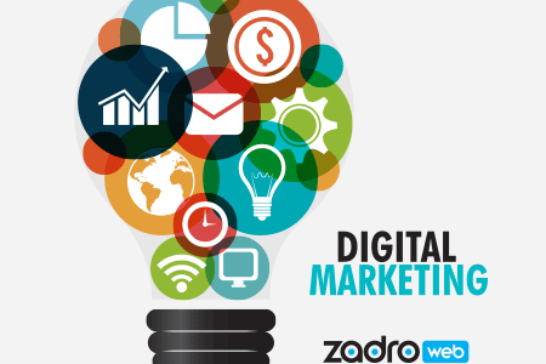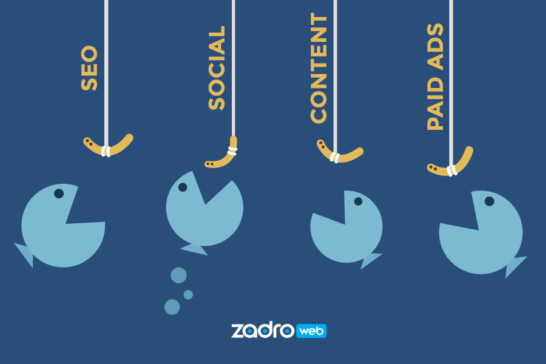The advent of the internet has significantly changed the way businesses market themselves and their products. Sure, traditional print and media advertising still has its place (and they can still be effective), but having a digital marketing strategy in place has become essential for the success of any business. And there's a very good reason for that.
Digital marketing has a lot to offer, regardless of the size or focus of your business. It costs 62% less per lead than traditional media marketing, and the costs are more easily amortized overtime to deliver a better return on your investment. Digital marketing allows you to more effectively target your desired market, so you can reach out to an already receptive audience who is primed to be interested in what you have to offer.
Best of all, digital marketing is extremely flexible, allowing you to quickly react to changes in your niche industry or in the market itself. However, like any form of marketing, it is important to understand how digital marketing works, and how it can be used to grow your business. Or as we like to call it, digital business growth! Let's look at a few basic rules of digital marketing to get your business on track for online success.
Know Your Audience
Before you can put any digital marketing strategy into play, you need to think about your target market. Performers and public speakers would call this knowing your audience, and it simply means crafting content that will appeal to your target demographic.
For example, you (probably) wouldn't perform Chekhov in the original Russian for grade school students. Similarly, you wouldn't market winter wear to customers in the Sahara. The essence of a good digital marketing strategy is telling a story, and that story must provide value to your audience. It should be interesting and engaging enough to inspire them to become a customer. But above all, it must be relevant to the consumer's needs.
When starting a digital marketing campaign, this is where information architecture (IA) and keyword research come into play. These initial steps are tedious, require a lot of patience, but are critical for your online efforts to succeed.
Go Where Your Audience Goes
Once you understand your target market better, you need to go where they go and focus your online strategies accordingly. Think about what digital platforms your target audience is using, and reach out to them directly. You also need to ensure that you, and your online content, are easy to find. Here are some key points to consider:
- Social Media - Social media is a prime mover in digital marketing, but it is only effective if you know where your target market hangs out. If you are targeting business professionals, you want to have a social media presence on LinkedIn and Twitter. If you're targeting the youth market you'll want to head to TikTok, Facebook, Instagram, and Snapchat. Match your brand and your product to your target market, and go where they go on social media.
- Mobile Platforms - Mobile search has become increasingly important for digital marketing as more and more people access the internet via tablets and smartphones. Make your primary website mobile-friendly, and make sure your PPC advertising campaigns have a mobile element.
- Paid Marketing - Beyond your own website and your social media presence, you need to consider other online marketing strategies like paid advertisements, direct email promotions, and both direct targeting and retargeting channels. These will all contribute to your campaign and will help to promote your brand and attract leads to your website where they can be converted into customers.
- SEO - Finally, search engine optimization is the key component of digital marketing. Whether it's your website or your blog, your social media posts, or your paid advertisements, the content must be properly optimized so that it can be easily found in the search results. Without a strong SEO backbone, your digital marketing strategies will fall far short of the mark.
Content Drives the Conversion Funnel
Content is one of the most important aspects of any digital marketing campaign. Whether it's a blog article or a social media post, your online content must engage, inform, entertain, and inspire. Good content is how you attract attention to your brand, define its value, and establish it as trustworthy in the minds of consumers.
It is the foundation of a successful buying cycle and brings traffic to your website where leads can be converted into customers. Content also feeds the search engines, keeping your brand identity afloat in a crowd of other businesses competing for prime search engine real estate. Good content can take many forms. Here are a few examples to get you started:
- Blog Articles (how-to articles, step-by-step guides, industry news, etc.)
- Social Media Posts
- Product Reviews
- Video Tutorials (video content is becoming increasingly popular with both the public and the search engines)
- Infographics
- Free E-books and White Papers
Again, SEO is vital on all channels, and all of your content should be properly optimized with an eye towards long-term organic search.
Engagement and User Experience
A successful digital marketing campaign doesn't end when traffic is brought through your virtual doors, it must be sustained through constant engagement. A steady stream of quality content is a good first step, but once you have your audience's attention you need to follow through.
That means responding to blog comments and social media responses (especially when they are negative or critical of your product or service), sending out email follow-ups and newsletters, providing links to valuable content (on and off your website), and regularly updating both your primary website and your social media accounts. An effective digital marketing campaign is an ongoing process and requires your attention.
Along with engagement, you must provide an excellent user experience on your website. Is your website easy to navigate? Can your visitors find their way to a clear call-to-action (CTA) and find more information about your products or services? Google has been integrating user experience (UX) more and more into its ranking factors. Heck, it's part of their core philosophy! It's very important that UX become a large part of your digital business growth strategy, it's the key to the future of SEO.
Setting and Measuring Your Digital Goals
Finally, it is important to set clear and measurable goals for your digital marketing campaign. You must also take steps to monitor that campaign so that you can track its success and make any necessary changes to improve its performance. Only then can you maximize your ROI, and reap the full benefits of your digital marketing strategies.
There are a number of analytics tools to help you monitor your digital marketing efforts, the most popular of which is probably Google Analytics. But there are other alternatives that can help you track your digital marketing campaign's performance and identify areas that can be improved upon.
Final Thoughts
Will digital business growth be your primary channel for new customers? It should. It's clear that it is taking on ever-growing importance for businesses that want to succeed in an increasingly competitive marketplace.
A sound digital marketing strategy can help you establish your brand and promote your products and services to an audience who is readily accessible and primed to hear your message. In the 21st century, digital marketing is vital to the growth and success of any business, regardless of size or industry focus.
What has your experience been with digital marketing? Reach out to our team so we can show you how to accelerate your online presence and drive new sales.



